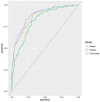Prevalence and correlates of subjective cognitive impairment in Chinese psychiatric patients during the fifth wave of COVID-19 in Hong Kong
- PMID: 37663610
- PMCID: PMC10469870
- DOI: 10.3389/fpsyt.2023.1216768
Prevalence and correlates of subjective cognitive impairment in Chinese psychiatric patients during the fifth wave of COVID-19 in Hong Kong
Abstract
Introduction: The extent of cognitive impairment and its association with psychological distress among people with pre-existing mental illness during COVID-19 is understudied. This study aimed to investigate prevalence and correlates of subjective cognitive impairment (SCI) in Chinese psychiatric patients during fifth-wave of COVID-19 in Hong Kong (HK).
Methods: Four-hundred-eight psychiatric outpatients aged 18-64 years were assessed with questionnaires between 28 March and 8 April 2022, encompassing illness profile, psychopathological symptoms, coping-styles, resilience, and COVID-19 related factors. Participants were categorized into moderate-to-severe and intact/mild cognitive impairment (CI+ vs. CI-) groups based on severity of self-reported cognitive complaints. Univariate and multivariate regression analyses were conducted to determine variables associated with CI+ status.
Results: One-hundred-ninety-nine participants (48.8%) experienced CI+. A multivariate model on psychopathological symptoms found that depressive and post-traumatic-stress-disorder (PTSD)-like symptoms were related to CI+, while a multivariate model on coping, resilience and COVID-19 related factors revealed that avoidant coping, low resilience and more stressors were associated with CI+. Final combined model demonstrated the best model performance and showed that more severe depressive and PTSD-like symptoms, and adoption of avoidant coping were significantly associated with CI+.
Conclusion: Almost half of the sample of psychiatric patients reported cognitive complaints during fifth-wave of COVID-19 in HK. Greater depressive and PTSD-like symptom severity, and maladaptive (avoidant) coping were found as correlates of SCI. COVID-19 related factors were not independently associated with SCI in psychiatric patients. Early detection with targeted psychological interventions may therefore reduce psychological distress, and hence self-perceived cognitive difficulties in this vulnerable population.
Keywords: COVID-19; coping styles; depression; mental disorders; self-reported cognitive complaints; traumatic stress symptoms.
Copyright © 2023 Fung, Chan, Chui, Wong, Chan, Chu, So, Chung, Lee, Cheng, Law, Chan and Chang.
Conflict of interest statement
The authors declare that the research was conducted in the absence of any commercial or financial relationships that could be construed as a potential conflict of interest.
Figures

Similar articles
-
The prevalence and correlates of suicidal ideation in Chinese psychiatric patients during the fifth wave of COVID-19 in Hong Kong.Eur Neuropsychopharmacol. 2023 Dec;77:4-11. doi: 10.1016/j.euroneuro.2023.08.485. Epub 2023 Sep 1. Eur Neuropsychopharmacol. 2023. PMID: 37660441
-
Network analysis on psychopathological symptoms, psychological measures, quality of life and COVID-19 related factors in Chinese psychiatric patients in Hong Kong.BMC Psychiatry. 2024 Apr 12;24(1):271. doi: 10.1186/s12888-024-05690-7. BMC Psychiatry. 2024. PMID: 38609962 Free PMC article.
-
COVID-19 perseverative cognition and depressive symptoms in Hong Kong: The moderating role of resilience, loneliness and coping strategies.J Affect Disord. 2023 Sep 15;337:86-93. doi: 10.1016/j.jad.2023.05.058. Epub 2023 May 23. J Affect Disord. 2023. PMID: 37230268 Free PMC article.
-
Prevalence and correlates of depression and anxiety in caregivers of children with attention-deficit/hyperactivity disorder during the fifth wave of COVID-19 and school closure in Hong Kong.Ann Gen Psychiatry. 2025 May 13;24(1):26. doi: 10.1186/s12991-025-00569-7. Ann Gen Psychiatry. 2025. PMID: 40361152 Free PMC article.
-
Psychopathology and psychological problems in patients with burn scars: epidemiology and management.Am J Clin Dermatol. 2003;4(4):245-72. doi: 10.2165/00128071-200304040-00004. Am J Clin Dermatol. 2003. PMID: 12680803 Review.
References
-
- World Health Organization (WHO) . Timeline: WHO's COVID-19 response (2020). Available at: https://www.who.int/emergencies/diseases/novel-coronavirus-2019/interact... (Accessed December 18, 2022).
-
- Blasco-Belled A, Tejada-Gallardo C, Fatsini-Prats M, Alsinet C. Mental health among the general population and healthcare workers during the COVID-19 pandemic: a meta-analysis of well-being and psychological distress prevalence. Curr Psychol. (2022):1–12. doi: 10.1007/s12144-022-02913-6, PMID: - DOI - PMC - PubMed
-
- Brailovskaia J, Cosci F, Mansueto G, Margraf J. The relationship between social media use, stress symptoms and burden caused by coronavirus (Covid-19) in Germany and Italy: a cross-sectional and longitudinal investigation. J Affect Disord Rep. (2021) 3:100067. doi: 10.1016/j.jadr.2020.100067, PMID: - DOI - PMC - PubMed
LinkOut - more resources
Full Text Sources
Miscellaneous

